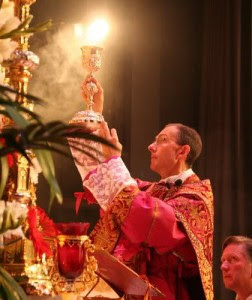Why Have Christians Changed the Sabbath?
"Remember to keep holy Sabbath day. Six days you may labour and do all your work, but the seventh day is the Sabbath of the Lord, your God. No work may be done then either by you, or your son or daughter, or your male or female slave, or your beast, or by the alien who lives with you. In six days the Lord made the heavens and earth, the sea and all that is in them; but on the seventh day He rested. That is why the Lord has blessed the Sabbath day and made it holy" (Ex 20:8-11).The word "Sabbath" is an Anglicised version of the Hebrew Shabbath (שַׁבָּת, or Shabbat), which means means "day of rest". It derives from the verb shavath (שָׁבַת, Strong's Concordance no. 7673 as šāvat, often shavat), defined as "desist from exertion" (often "rest" or "cease"). The word shavath was first used in the Biblical account of the seventh day of Creation (Genesis 2:2-3).
The Sabbath commemorates God's day of rest during the seven-day creation account of Genesis, it was also sacred because of what God has done for His people when He liberated them from slavery in Egypt: "For remember that you too were once slaves in Egypt, and the Lord your God brought you from there with His strong hand and outstretched arm. That is why the Lord, your God, has commanded you to observe the Sabbath day" (Dt 5:15). Therefore, the Sabbath was not only one day of rest and refreshment for everyone, being mindful of the many blessings received through creation, but also a day of remembering the covenant He had made with His people through the Passover sacrifice and the giving of the Law at Mount Sinai. The Sabbath was indeed the Day of the Lord.
For Christians the "Sabbath" rest was transferred to the first day of the week—Sunday, the day Our Lord Jesus Christ rose from the dead. For us, Sunday marks the day of the new creation, when Christ conquered sin, darkness and death. Sunday marks the day of the new covenant when Christ, the High Priest who offered Himself as the unblemished Passover lamb of sacrifice on the altar of the cross, gave the promise of everlasting life. Therefore, Sunday is the fulfilment of the Sabbath of the Old Testament. St. Justin Martyr (d. 165) wrote, "Sunday, indeed, is the day on which we hold our common assembly because it is the first day on which God, transforming the darkness and matter, created the world; and our Saviour Jesus Christ, arose from the dead on the same day." Sunday is often spoken of as "the Christian sabbath," but this is not a technical description. Sunday is not a strict replacement for the sabbath (which has been abolished), but a day the Church instituted to fulfil a parallel function. Thus Ignatius of Antioch, the earliest Church Father to address this question, states that Christian converts "have given up keeping the sabbath and now order their lives by the Lord's Day instead, the day when life first dawned for us, thanks to him [Christ] and his death" (Letter to the Magnesians 9 [A.D. 107]).
Certainly by the 2nd century A.D., the observance of a corporate day of worship on the first day (Sunday, or Saturday night) had become commonplace, as is widely attested in the writings of the Early Church Fathers (as documented in many studies, eg. Bauckham, R.J. (1982). "The Lord's Day". In Carson, Don A., From Sabbath to Lord's Day., Wipf & Stock Publishers/Zondervan. pp. 221–50.ISBN 978-1-57910-307-1). For these first Christians the "Lord's Day" meant the first day or Sunday.
There is clear textual evidence for first-day assembly. On the first day of the week (usually considered the day of Firstfruits), after Jesus has been raised from the dead (Mk. 16:9), he appears to Mary Magdalene, Peter, Cleopas, and others. "On the evening of that first day of the week" (Roman time), or the evening beginning the second day (Hebrew time), the resurrected Jesus appears at a meeting of ten apostles and other disciples (Jn. 20:19). The same time of the week "a week later" (NIV) or, more literally, "after eight days again" inclusive (KJV), Jesus appears to the eleven apostles and others (Jn. 20:26). After Jesus ascends (Ac. 1:9), on the feast of Pentecost or Shavuot (the 50th day from Firstfruits and thus usually calculated as the first day of the week), the Spirit of God is given to the disciples, who baptise 3,000 people into the apostolic fellowship. Later, on one occasion in Troas, the early Christians meet on the first day (Hebrew) to break bread and to listen to Christian preaching (Ac. 20:7). Paul also states that the churches of Corinth and Galatia should set aside donations on the first day for collection (1 Cor. 16:2). Didache 14:1 (AD 70-120) states "But every Lord's day gather yourselves together, and break bread, and give thanksgiving"; the first clause in Greek, "κατά κυριακήν δέ κυρίου", literally means "On the Lord's of the Lord", and translators supply the elided noun (e.g., "day", "commandment" (from 13:7), or "doctrine"). Gleason Archer regards this as clearly referring to Sunday. Breaking bread refers clearly to Eucharist (cf. Ac. 2:42, 20:7).
Despite this, some revisionist Christian sects have adopted sabbatarianism and moved away from the ancient tradition documented above, citing their own interpretation of Scripture as the justification for this move. This is bizarrely based on one word: they consider "Kuriakos" (Revelation 1:10) as (first-day) weekday on which John was raptured in spirit, or as (seventh-day) seventh-millennium Sabbath unto which he was raptured. Similarly, the word "Sunday" is typically vilified as recalling pagan sun worship on that day (Ezekiel 8:16-18). However, many Christians affirm commonly that communal worship is not limited to the Sabbath (Acts 2:45), and that "Sabbath was made for man", meaning all mankind (Mark 2:27).
Despite our very complex and busy modern times, we must strive to keep the "Sabbath Day"—Sunday—holy. Our first priority is to worship God publicly by participating at holy Mass. Since the days of the Apostles, the Church community has gathered together on Sunday to attend Mass. The Code of Canon Law logically mandates, "On Sundays and other holy days of obligation the faithful are bound to participate in the Mass" (No. 1247). This obligation makes perfect sense. Following St. Thomas Aquinas' thought, we have a moral obligation to give visible, public and regular worship to the God who created all things, including ourselves; who has blessed us in many ways; and who saved us from sin. Just as we attend to our material and physical concerns—such as getting proper sleep, food, exercise and hygiene—we must attend to the well-being of our souls through prayer and public worship.
While this is a precept of our Church, we should consider it a privilege to attend Mass. We gather as a Body of Christ sharing a common unity of faith and baptism which overrides any ethnic, cultural or other difference. At Mass, we affirm our identity as a Roman Catholic Christians. We are nourished through the Word of God proclaimed in sacred Scripture and explicated by the priest. We are then plunged into the mystery of Christ's passion, death and resurrection, and nourished again through a sharing in His sacred Body and Blood in the holy Eucharist. When "Mass has ended" and we have given thanks, we then go on to our regular routine and our busy world, but we take Jesus with us. The ending really marks a beginning. The Mass becomes the launch-pad for the rest of the week.
I think that those who disregard the obligation of attending Sunday Mass for some frivolous reason or lame excuse either do not understand what they are missing or have their priorities out of order. God must come first—not football or rugby, shopping visits to Bluewater or a lazy day in bed. We cannot play games with God and say, "Oh, God will understand. I can pray in my heart." God is God and we are His creatures. Unless we are sick, facing an emergency or have some other serious reason, we owe God His due worship.
If we consider ourselves part of the Church, it is only right to worship as part of the Church. To fail in this obligation is to commit a grave sin (CCC 2181). I often think of so many people who lived under communism and risked the loss of freedom, job opportunities and education just to attend Mass. What good excuse to we have to skip Mass? How blessed we are in this country to be able to worship freely and easily.
If Mass seems "boring" and not as exciting as some other activity, maybe the problem is that the person is not putting enough effort into it. We ought to arrive ahead of time to collect our thoughts and focus on God, to pay attention to the readings and sermon, to pray the Eucharistic prayer with the priest, to receive holy Communion wholeheartedly and to give thanks for what we have received.
We need to be active and engaged worshippers, not simply "pew potatoes". In an anonymous sermon of the very early Church, the faithful were admonished:
"Tradition preserves the memory of an ever-timely exhortation: Come to church early, approach the Lord and confess your sins, repent in prayer...Be present at the sacred and divine liturgy, conclude its prayer and do not leave before the dismissal...We have often said, 'This day is given to you for prayer and rest. This is the day the Lord has made, let us rejoice and be glad in it.'"The second priority of the Sabbath is to take time for personal rest, for family, and for spending time with those that we love. In our fast-paced world, sometimes Sunday becomes "catch-up" day—of running to Tesco, doing laundry and the like. Granted, sometimes we have no choice in the matter, but shouldn't we try to restructure our lives and strive to accomplish those tasks during the rest of the week? We would then have plenty of time on Sunday to relax, read, think, meditate and talk with God in the quiet of our hearts.
Sunday should be a family-oriented day. Unfortunately, many families lead fragmented lives, with people running in different directions. Sometimes family life can feel more like you're just a group of people living under the same roof than a real family living in a home. We need to enjoy our loved ones' company and take time to share our lives with them.
We should also think of our "extended family"—Sunday should also be a day for charitable activities, such as visiting the sick or elderly, especially elderly relatives who know the burden of being alone.
In spite of the complexities of modern living, we need to do our best to make Sunday the Lord's Day. François-Marie Arouet, the philosopher more widely know by his nom de plume Voltaire (21 November 1694 – 30 May 1778) was a critic and attacker of the Church. He said, "If you want to kill Christianity, you must abolish Sunday." Sadly, many have abolished Sunday on their own by how they live their lives, and in so doing, have abolished the presence of God in their lives. We would all be much better off, and much happier in ourselves if we were mindful of Sunday as a day for worshipping God, publicly as a community, together as a family and privately praying to Him; sharing ourselves generously with each other and sharing our love with our families.




Comments
Post a Comment